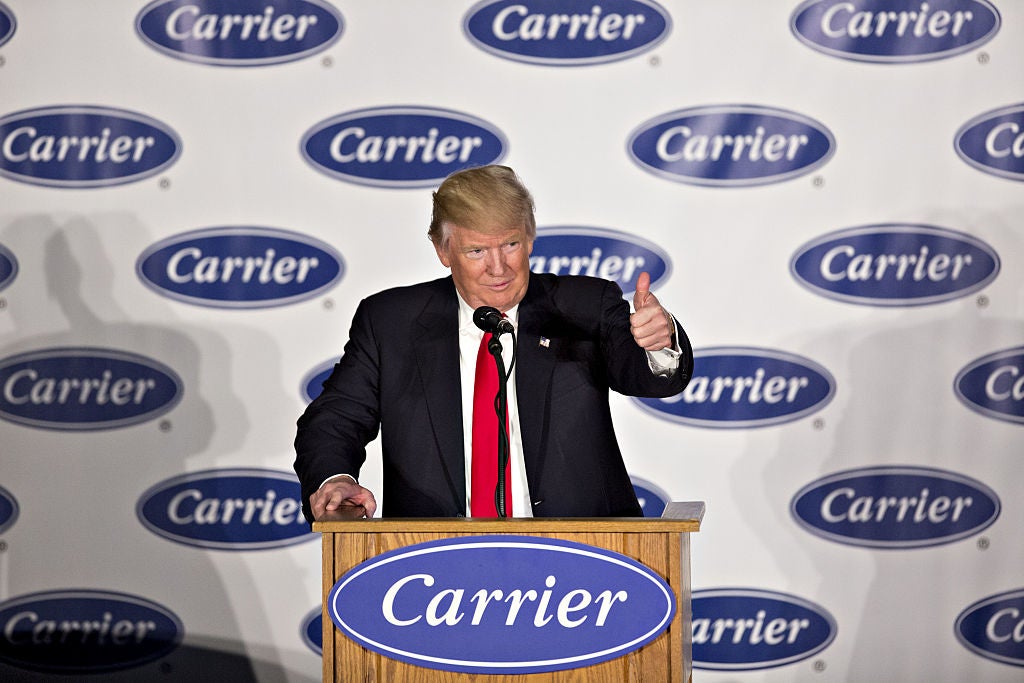Company which organised jobs deal with Donald Trump gets $2.5bn Pentagon contract without competition
'That’s the government doing business with big corporations like always'

Your support helps us to tell the story
From reproductive rights to climate change to Big Tech, The Independent is on the ground when the story is developing. Whether it's investigating the financials of Elon Musk's pro-Trump PAC or producing our latest documentary, 'The A Word', which shines a light on the American women fighting for reproductive rights, we know how important it is to parse out the facts from the messaging.
At such a critical moment in US history, we need reporters on the ground. Your donation allows us to keep sending journalists to speak to both sides of the story.
The Independent is trusted by Americans across the entire political spectrum. And unlike many other quality news outlets, we choose not to lock Americans out of our reporting and analysis with paywalls. We believe quality journalism should be available to everyone, paid for by those who can afford it.
Your support makes all the difference.United Technologies handed Donald Trump bragging rights in late 2016 when, just weeks after he won the election, the manufacturing giant publicly credited the soon-to-be president with striking a deal to save hundreds of Indiana furnace factory jobs that seemed destined to move to Mexico.
In exchange for $7m (£5m) in state tax credits, the firm agreed to retain 770 of roughly 1,400 positions at a Carrier plant in Indianapolis and send the rest to Monterrey, Mexico. Greg Hayes, the company’s chairman and chief executive, later suggested federal contracts also played a role. He said: “I was born at night, but not last night.... I also know that about 10 per cent of our revenue comes from the US government.”
More than a year into Mr Trump’s presidency, that federal money continues to flow to United Technologies’ subsidiaries. The Defense Department recently gave the company’s Connecticut-based aeronautics subsidiary a $2.5bn contract without competition to provide propeller systems, wheels and brakes, landing gear, flight sensors and other equipment directly to the armed services.
The contract applies to aeroplane parts for which the Defense Department considers United Technologies the only qualified supplier, effectively renewing an earlier 10-year contract set to expire in April. The award followed an earlier $2.74bn sole-sourced Air Force contract handed to Pratt & Whitney, another United Technologies subsidiary.
A United Technologies spokesperson said in an email that the contract awarded Wednesday is in no way related to the deal negotiated with Carrier. The company merited the contract because it maintains numerous patents for airplane parts that it considers proprietary, an analyst said.
“It’s not that other people can’t make [the parts being sold under the contract awarded Wednesday], but United Technologies holds patents that mean others are not allowed to make them,” said Loren Thompson, an aerospace analyst with the non-profit Lexington Institute, which gets some funding from United Technologies.
Still, the size of the award raised eyebrows.
“Sole-sourced contracts for these types of materials are not unusual, but $2.5bn is unusually big,” Mr Thompson said.
It comes as United Technologies is moving forward with a $30bn merger with Rockwell Collins, another aerospace parts manufacturer. Mr Trump’s tax bill will make it easier for the company to pay off debt under that deal because of regulatory changes that will allow it to return cash from overseas.
The fortunes of the Carrier plant have not been so bright.
Since Mr Trump’s jawboning, the plant experienced a round of layoffs in July, when 337 workers left the plant. Another 300 positions were terminated in January.
“It just doesn’t seem that the government is going to use its contracts to exert any leverage on the jobs front,” said Richard Aboulafia, an aerospace analyst with Teal Group. “It seems like it’s not as much of an action item as it was a year ago, and it wasn’t then either. It was just optics.”
Robert James, president of the local United Steelworkers union that represents the Carrier employees, said he hasn’t heard of more anticipated layoffs. But workers are sceptical about the future. Four days after Mr Trump visited Indianapolis to celebrate the Carrier deal, United Technologies chief executive Hayes said in a television interview that he planned to invest in automation, reducing the need for human labour.
Some Carrier workers expressed resignation that they would see little benefit from the big defence deals.
“That’s the government doing business with big corporations like always,” said TJ Bray, another worker on the factory floor.
The Washington Post
Subscribe to Independent Premium to bookmark this article
Want to bookmark your favourite articles and stories to read or reference later? Start your Independent Premium subscription today.
Join our commenting forum
Join thought-provoking conversations, follow other Independent readers and see their replies
Comments